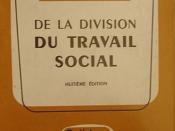In everyday language, 'to deviate' means 'to stray from an accepted path' and most sociological definitions elaborate on this idea. What causes humans to act in certain ways is a disputed topic among researchers and many sociologists have tried to answer this question. This essay will critically analyse Durkheim's notion that even in a "society of saints" crime will still be found (Roach-Anleu 2006, p. 425) and further discuss the connection between deviance and social control. In conclusion, an evaluation on the strengths and weaknesses of two of the more dominant sociological theories and perspectives, strain and labelling theory, which are believed by sociologists to explain the connections between deviance and social control in a changing society, will also be explored.
Lupton, Short & Whip (1992, p.133) define social control as 'the means by which societies are stabilised' with any behaviour which deviates from socially accepted norms being discouraged, therefore deviance consists of those acts which do not follow the norms and expectations of a particular group.
Norms, or rules about what members of a society should or should not do, are seen to be universal, that is, "all societies have them and members of all societies enforce them" (Goode 1993, p. 42).
Social control attempts to discourage behaviour that either directly harms an individual or group, or threatens a society with chaos and disintegration and is intended to make a statement about what is considered by either some or most members of the society to be right, good and proper. They embody certain principles of moral correctness separate and independent of what they do for the society's physical survival, therefore, we are expected to do certain things because they are right and that is the way they are done. Hence, if deviance disturbs social equilibrium, then social control attempts...


